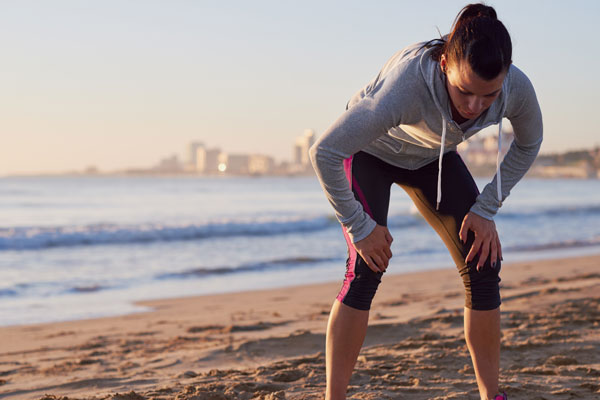Given the incredibly hot weather we’ve been having lately on the Space Coast, 3D Sports Medicine and Orthopaedic Center wanted to share some summer exercise tips that work living in a place like Florida.
There’s no getting around it: Florida is hot. It has one of the warmest, most humid climates in the United States, and its average temperatures rarely dip below sixty degrees Fahrenheit throughout the year. According to TripSavvy, Central Florida has an average high of 83 degrees for the entire year – and that’s usually much higher during the summer months. Between June and September, the average high on our Space Coast hovers around 88 degrees with high humidity. Right now, the weather forecast shows highs in the nineties all through the month of August, and could get even higher.
The hot and humid environment can make it hard to even go outside and live your daily life, much less get any kind of physical activity. But we need to exercise to stay healthy, especially during the summer months when there’s such a stereotype of being sluggish and lazy! So how do we reconcile the need to stay fit with the need to stay safe in the Florida heat? Read on for some of our top healthy fitness tips for summer exercise!
1. Exercise Indoors
This is an easy one. If you have the means, you should absolutely consider moving your summer exercise indoors. Gyms and fitness centers usually are heavy on air conditioning, because there are so many working out indoors, but there are other amenities like water fountains, lockers, showers, and recreation as well that make exercising more comfortable and convenient. Exercising when you’re out of the heat will keep your heart rate and blood pressure lower, and will lessen your risk of dehydration or lightheadedness. However, if you have concerns about the COVID-19 pandemic with regards to working out indoors, have no fear – there are plenty of other ways you can stay healthy and active during the Florida summer months.
2. Go out early
Contrary to what some people think, working out at night does not necessarily mean it’s going to be cooler than during the day. If the day has been especially hot, that heat will have been building up over the course of the day, which means it’s going to take a long time to cool off. If temperatures reached the mid-to-high nineties during the day, it could very well still be 85 degrees and humid late at night. Instead, consider getting up early for summer exercise, before the heat of the day has a chance to set in. According to ACTIVE, the absolute worst time to exercise during the summer months is between 10am and 3pm, when the sun is most directly overhead.
3. The right equipment is everything
Lightweight clothing is essential for outdoor summer exercise – keep your clothes light (both in material and color, as dark clothes absorb sunlight and can overheat you), wear moisture-wicking fabric that will keep you from sweating through everything, and stock up on high-SPF sunscreen. You’ll also want to carry a water bottle everywhere you go, but don’t just use it while you’re working out – be sure to hydrate before and after you exercise as well. Your body isn’t always the best at telling you what it needs, so play it safe by hydrating early and often.
4. Know the danger signs
Summer exercise carries with it a host of possible health-related dangers, especially if you have a history of heart disease, diabetes, medication, or long-term illness. It’s best to get cleared by your primary care physician before you start exercising if you’re at risk for any of these conditions. However, even the most healthy individual can become dehydrated, dizzy, or exhausted in the summer heat if they don’t know the warning signs. If you’re exercising and you feel a headache, fatigue, listlessness, extremely dry skin, or unnaturally high heart rate, you may be dehydrated – stop your exercise right away, move into the shade, and drink some water. If you suddenly have a high fever, weak pulse, extreme confusion, or find it very hard to breathe, stop exercising and call 9-1-1 immediately – you may be suffering from heat stroke, which requires medical attention. You can cut down on all of these risks by sticking to the shade, staying hydrated, and paying attention to your body’s signals as often as possible. For more information, the American Heart Association has a great article about staying safe in hot weather.
And there you have it! Dr. Dominguez and the 3D Sports Medicine team understands the importance of keeping your body fit for sports and healthy living. So we realize that heat and humidity shouldn’t stop you from staying active during the summer months, and if you stick to these tips, it doesn’t have to. For more in-depth advice, check out the Mayo Clinic, Cleveland Clinic, and Planet Fitness.





